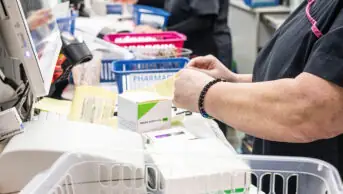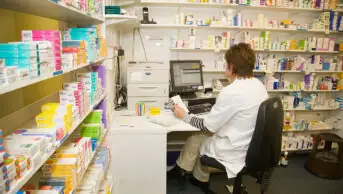
Shutterstock.com
Community pharmacists in England will be offered funded clinical skills training, including history-taking and identification for a range of serious conditions, as part of a £2m programme expected to start in December 2022.
Health Education England (HEE) says it is looking for providers to deliver training for up to 10,000 pharmacists, with a mix of online and in-person training.
According to HEE, the training programme is intended to “enable the transformation of the pharmacy workforce” to deliver clinical services and is part of a three-year programme of education and training for post-registration community pharmacy professionals, agreed in August 2021.
The programme will run until March 2024, with community pharmacists wanting to take part required to first pass an online module in history taking, before being able to take specialised modules in dermatology, cardiology, ear nose and throat, and paediatric care. They will be able to take one specialist module each financial year and the scheme is open to locums and part-time pharmacists (see Box).
Louise Baglole, director of professional services and development at the National Pharmacy Association, welcomed the initiative: “This is a welcome expansion of clinical skills training for community pharmacists and will support the safe and effective provision of NHS services. As a major provider of learning and development ourselves, we know there is a direct line from investment in skills to improved patient care.”
However, Leyla Hannbeck, chief executive of the Association of Independent Multiple Pharmacies, made the point that while training is welcome, it does not address the workforce shortages and lack of funding affecting community pharmacy.
“We are suffering with workforce issues like everywhere else in the NHS. Unless we can meet those challenges in terms of getting enough funding to invest in workforce, it’s going to be difficult to manage the time and training,” she said.
“We want [community pharmacists] to be trained and to make sure the work becomes more clinical and service orientated. But if nobody helps us it is just going to be words, words, words.”
She said they were looking for the sort of funding that GPs were receiving to employ pharmacists in surgeries, so that funding is “a level playing field”.
Since 2019, the Centre for Pharmacy Postgraduate Education and the Royal Pharmaceutical Society have been delivering pharmacy integration programme-funded training to support the provision of the community pharmacist consultation service. This new scheme looks set to build on this training with more specialist modules.
Matt Aiello, national programmes lead (education reform) at Health Education England, said the clinical training scheme is intended to provide a “flexible portfolio of pharmacist training and development options”.
“Through this training pathway and our pharmacy integration programme more generally, HEE aims to ensure that all training and development is proportionate and relevant to identified service and public need,” he added.
“The provision of clinical skills training recognises that patients and other health professionals are becoming increasingly reliant on the clinical knowledge and skills of the pharmacy profession. The expansion of clinical skills training to community pharmacists will enable the transformation of the pharmacy workforce to support pharmacists to deliver a wider range of clinical services as part of cross-sector, multi-professional teams, working to deliver joined-up, integrated patient care pathways.
“The tender for training providers is now live, with an aim for training modules to be accessible from December 2022.”
Box: How will the training work?
An initial module in history taking and identification of serious conditions will be available only as an online, self-directed programme.
Pharmacists who already have these skills, such as independent prescribers, can skip the training and take an assessment straight away.
Pharmacists will have to pass the assessment before taking any of the specialist modules. This will require pharmacists to show they can rule out major illnesses using history taking and clinical assessment skills, and make appropriate onward clinical referrals, with sign-posting to appropriate services and safety-netting or follow-up for patients not requiring referral.
After passing the initial online module, pharmacists will be able to take the specialist modules. These will be delivered in a combination of face-to-face or online sessions:
- The dermatology module will include wound care, identification and management of rashes, common skin conditions, identification of serious rashes, moles and suspected skin cancer;
- The cardiology module will include history taking and assessments to identify common cardiovascular conditions, including blood pressure, heart rate and pulse oximeter assessments. The module will also include how to manage acute chest pain and the common side effects of frequently prescribed cardiovascular medicines;
- The ear, nose and throat (ENT) module will teach pharmacists about common ENT conditions; how to spot potentially serious ENT conditions; examination of head, neck, throat and nose; otoscope inspection of ears; treatments for self-care of common ENT conditions; and antimicrobial resistance;
- The paediatric module will teach pharmacists how to identify and manage common acute presentations in children — such as fever, cough, diarrhoea and vomiting — and how to spot signs of serious illness in babies and children. It will include care of common chronic conditions and self-care advice for looking after a sick child.
All modules will end with an assessment and pharmacists will be given a certificate of completion when they pass.
- This article was updated on 4 August 2022 with additional comment from Health Education England


